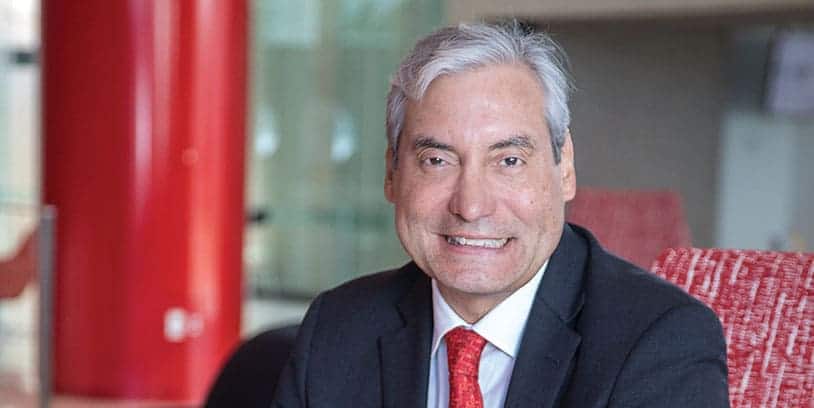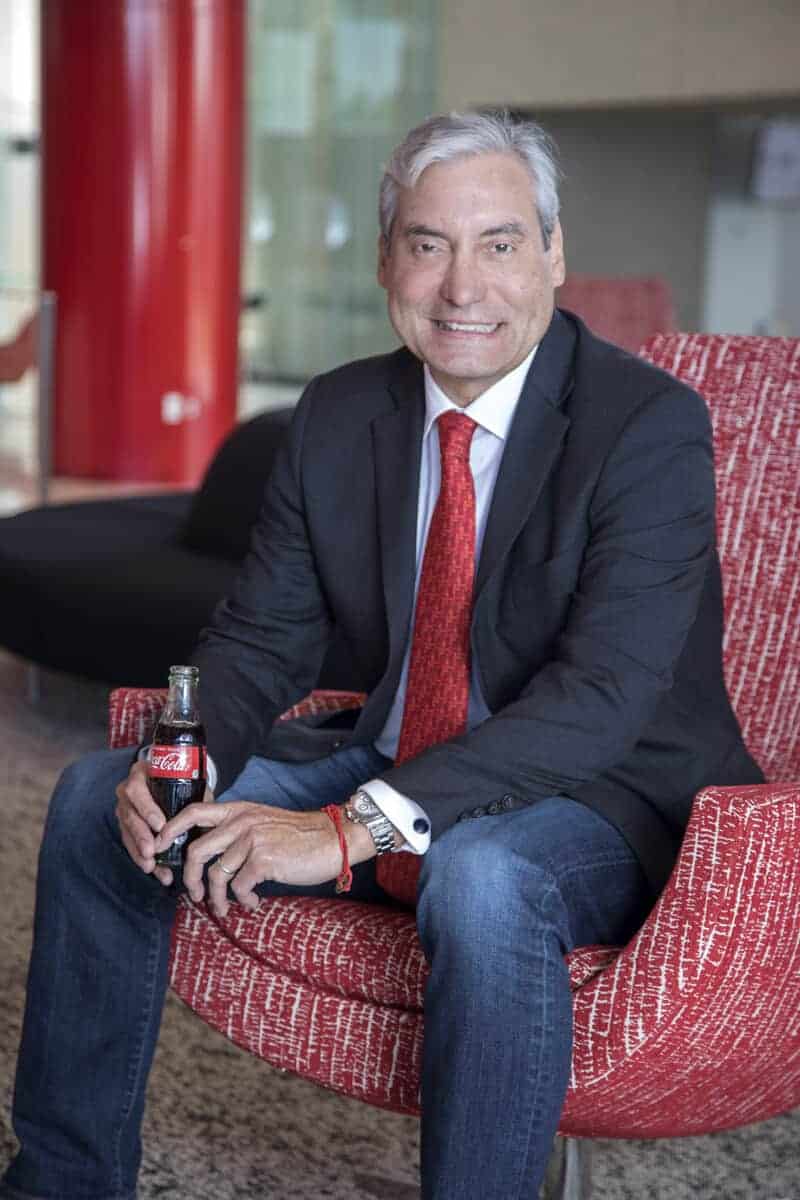A True Leader is a Transformational Agent
Alfredo Rivera was named president of Coca-Cola North America in August of last year, becoming the first Hispanic to hold this prominent position. The executive, who has worked for Coca-Cola for 23 years, was born in Honduras and developed in Latin America most of his professional experience.
Rivera, 59, gave an exclusive interview and responded in writing to Abasto Magazine questions amid a busy work schedule. During the coronavirus pandemic, Coca-Cola was implementing crucial operational changes across the company.
In a humble and frank manner, Rivera recounted his experiences as a student in his native Honduras, about his passion for sports and university life in the United States. He has a bachelor’s degree in history and a master’s degree from the University of Southern Mississippi. He also completed the Advanced Management Program at Harvard Business School.
On leadership and how to achieve success, Rivera described how he moved up the ladder in his work with Coca-Cola and what valuable lessons he learned from a moment of crisis in his career.
Abasto Magazine: Let’s start with your story in Honduras, where were you born, how did you live your childhood and adolescence, could you describe to me how your family environment was?
Alfredo Rivera: I had a very happy childhood in Honduras. We lived in a small town surrounded by Chiquita banana farms where my parents worked. It was a great place to grow up.
AM: How did you do as a student? What were your favorite subjects in school?
AR: I did pretty well in school. I enjoyed learning about history, geography, and social studies but was not a fan of math.
AM: What were your favorite hobbies, music, reading, or did you like any particular sport?
AR: Soccer was my favorite thing to do, by far. I played a lot of soccer with my friends every day after school. I also loved to read — science fiction for some time, but really anything that I could get my hands on. And for a while, I took up fishing. There was a lake about an hour and a half away from our house, and my parents would drop me off there to fish largemouth bass.
AM: When you finished high school, what motivated you to get a BA in Latin American Studies and an MBA?
AR: I attended high school in Mississippi, and to be honest, I didn’t know what I wanted to do afterward. But the University of Southern Mississippi was down the road, so I enrolled and ended up loving it. At first, I wanted to do engineering, but I quickly learned it wasn’t for me. Then I happened to meet a professor from the Latin American Studies program; the program sounded interesting, so I applied and was accepted.
AM: You studied at the University of Southern Mississippi. Where did you learn English? As a Hispanic, how was your experience studying at an American university?
AR: My hometown in Honduras had an American school for children whose parents worked on banana farms. So, I learned English at a young age. The school went up to 8th grade, and then I attended boarding school in the U.S. I had a great experience at the University of Southern Mississippi in the Latin American Studies program. I also played on the university’s soccer team, which was a lot of fun.
Related Article: The Coca-Cola Company Announces Reorganization and Downsizing
AM: After college, you returned to Honduras. At what age did you have your first job, what do you remember most about that experience?
AR: I was 22 years old when I got my first job out of college. A Coca-Cola bottler, Cervecería Hondureña, hired me. Being that young, I remember being nervous and realizing that I did not know anything about the business world. I had a lot to learn.
AM: When you started working in the beverage industry at Cervecería Hondureña, did you have any idea where you wanted to grow professionally?
AR: I enjoyed what I was doing at Cervecería Hondureña. I was learning and growing as a professional, but I was not yet focused on planning for my career. I was more focused on the moment.
AM: The 1980s were difficult in Honduras because of social and political conflicts and a weak economy. How did these events influence your life and work?
AR: I remember seeing the military in the streets so often that it became, in a way, normal to me. But I know the situation, unfortunately, became much worse after I left Honduras. At the time, I traveled all around the country for work, visiting our sales centers, so I stayed busy. I met many people that way and learned the business quickly.
AM: And what was the process you went through to join The Coca-Cola Company finally?
AR: Because of my roles with the Coca-Cola bottlers in Honduras and later in El Salvador, I was in regular contact with the company. In fact, I was offered and turned down a role with The Coca-Cola Company twice. It was not until a trip to Atlanta to the company headquarters in 1993 that I realized the incredible growth opportunity I could have with the company. Everyone working at the headquarters was from around the world and very smart. I knew it was time for me to make a move to keep growing in my career. So, in the end, it all worked out, and I was able to bring my experiences from the bottling system to the company a few years later.
AM: Your leadership qualities and knowledge of management and sales in the beverage industry enabled you to forge a successful path with Coca-Cola. But in life, not everything is rosy. What experiences can you share about the challenges, mistakes, or difficulties you have had to face during your 23 years of working with Coca-Cola?
AR: When I ran a region in Brazil, I learned an essential lesson about accountability. Our business unit was the largest in the region, but our results were not good enough. The way I was leading our team was too conservative. I was not bold about changing the business and making it better; I was going with the flow. It was a painful experience because I almost lost my job because of it. It was also a good learning experience because I learned that it’s up to me to be a catalyst for change — and not wait for someone else to do it. Years later, this lesson remains a personal motto that I share with my team: “It’s always better to be a change-agent than a victim of change.”
AM: In your work leading Coca-Cola operations in México and then in Latin America and the Caribbean, you have had to lead the business’s transformation. What advice can you offer to other leaders to succeed in the transformation processes of their companies and come out stronger?
AR: 1. Challenge yourself and the way you do things. 2. When business is good, don’t be satisfied. 3. Because it is at that moment, you must push yourself to learn more, experiment more, and make yourself better to achieve even more outstanding results.
AM: You are the first Hispanic to be named president of Coca-Cola North America. What does it mean to you to hold this position?
AR: Being named president of The Coca-Cola Company’s North American Operating Unit is a great honor. And it is a great responsibility. I am deeply honored to lead the company’s flagship market, where Coca-Cola began more than 134 years ago. Thinking back to my days playing soccer as a child in Honduras, from my first day working at the Honduran Brewery until today, it has been an incredible journey. I am excited about this new chapter working with my colleagues at Coca-Cola North America.
AM: A position like the one you hold now requires dedication, discipline, and many hours of work. How do you maintain the balance between your work and your family?
AR: I keep a good sleep routine: I go to bed early and get up early. I wake up around 5:30 a.m. to exercise before starting my day. I also find times during the week to take a break and read.
AM: Do you have a hobby that helps you keep stress from work at bay?
AR: I like to ride my bike. It reminds me of when I was a child in Honduras. While cycling, I listen to audiobooks or music; it is a learning way while enjoying the outdoors. It’s fun to ride a bike.
AM: The coronavirus pandemic has transformed the world, and we all hope that in 2021 things will improve. In terms of the economy, what is your vision of what to expect in the new year?
AR: I am optimistic at heart, so I think 2021 will be okay. It will all depend on how we continue to manage COVID-19 as vaccines become available.



